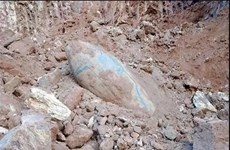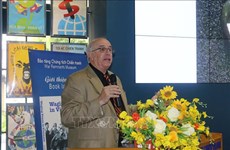USAID-funded project to support people with disabilities
A seminar was held in the southern province of Dong Nai on August 19 to discuss a project to support people with disabilities caused by Agent Orange/dioxin sprayed on seven localities of Vietnam during the war.
 Director of USAID’s Environment and Social Development Office in Vietnam Christopher Abrams speaks at the event (Photo: VNA)
Director of USAID’s Environment and Social Development Office in Vietnam Christopher Abrams speaks at the event (Photo: VNA)Dong Nai (VNA) – A seminar was held in the southern province of Dong Nai on August 19
to discuss a project to support people with disabilities caused by Agent Orange (AO)/dioxin
sprayed on seven localities of Vietnam during the war.
The event was co-organised by the Standing Agency of the National Steering Committee on the Settlement of Post-war Unexploded Ordnance and Toxic Chemical Consequences (Office 701) and the US Agency for International Development (USAID).
At the seminar, Director of USAID’s Environment and Social Development Office in Vietnam Christopher Abrams said the US over the time has teamed up with Vietnamese competent agencies to carry out various projects on war consequence settlement and support for AO/dioxin victims.
A project to support people with disabilities in seven localities follows the success of the previous cooperation projects between the countries, he said.
Abrams noted that as USAID has many experience in projects on health care, medical assistance and livelihoods for the disabled, the agency will help Vietnam ensure the efficient implementation of the project.
For his part, head of Office 701 Than Thanh Cong said the project aims to realise the memorandum of intent signed between the two agencies in April 2019.
Accordingly, USAID will grant 50 million USD to help Vietnam provide direct care, improve rehabilitation services, and develop social services to better serve people with disabilities in the central provinces of Quang Tri, Thua Thien-Hue, Quang Nam and Binh Dinh, and southern Dong Nai, Binh Phuoc and Tay Ninh provinces.
Vietnam is currently home to about 8 million people with disabilities, accounting for 8 percent of the population. The figure stood at more than 163,000 in the seven localities of the project. Most of the victims are poor people and facing difficulties in getting access to livelihoods and employment.-VNA
The event was co-organised by the Standing Agency of the National Steering Committee on the Settlement of Post-war Unexploded Ordnance and Toxic Chemical Consequences (Office 701) and the US Agency for International Development (USAID).
At the seminar, Director of USAID’s Environment and Social Development Office in Vietnam Christopher Abrams said the US over the time has teamed up with Vietnamese competent agencies to carry out various projects on war consequence settlement and support for AO/dioxin victims.
A project to support people with disabilities in seven localities follows the success of the previous cooperation projects between the countries, he said.
Abrams noted that as USAID has many experience in projects on health care, medical assistance and livelihoods for the disabled, the agency will help Vietnam ensure the efficient implementation of the project.
For his part, head of Office 701 Than Thanh Cong said the project aims to realise the memorandum of intent signed between the two agencies in April 2019.
Accordingly, USAID will grant 50 million USD to help Vietnam provide direct care, improve rehabilitation services, and develop social services to better serve people with disabilities in the central provinces of Quang Tri, Thua Thien-Hue, Quang Nam and Binh Dinh, and southern Dong Nai, Binh Phuoc and Tay Ninh provinces.
Vietnam is currently home to about 8 million people with disabilities, accounting for 8 percent of the population. The figure stood at more than 163,000 in the seven localities of the project. Most of the victims are poor people and facing difficulties in getting access to livelihoods and employment.-VNA













